Major Henry Charles David Marshall - Wallet 1 - Booklet 3 - Part 2
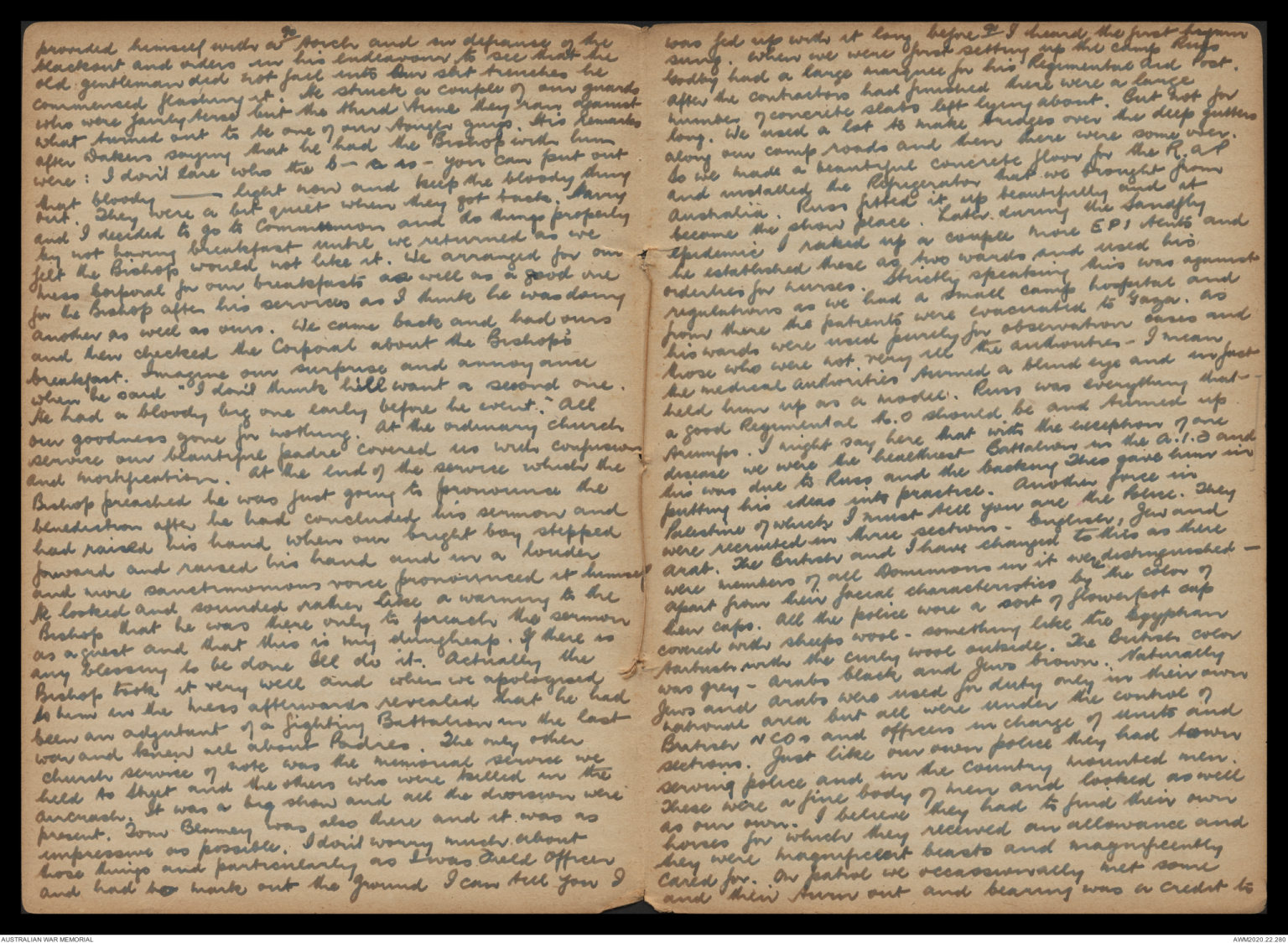
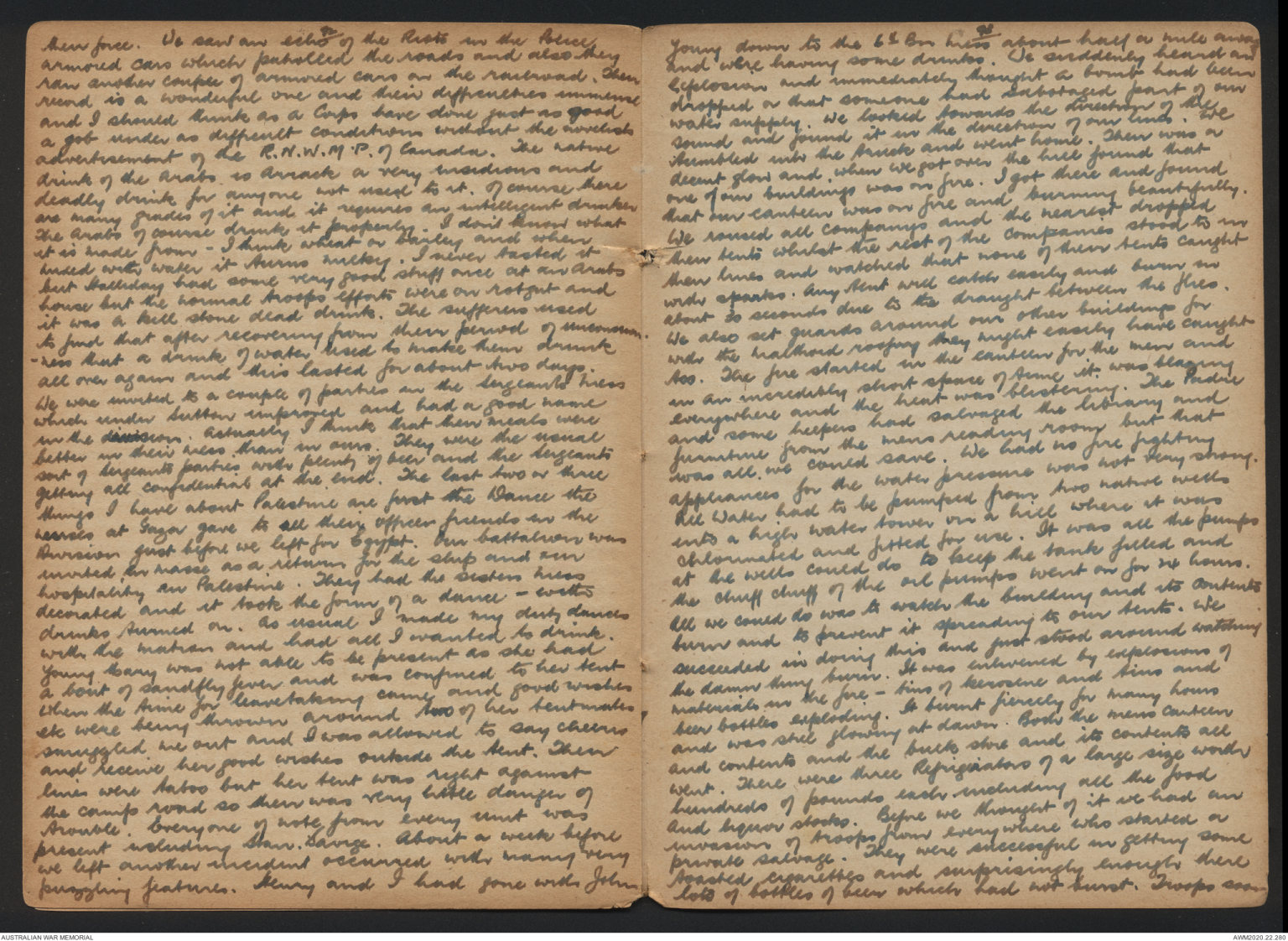
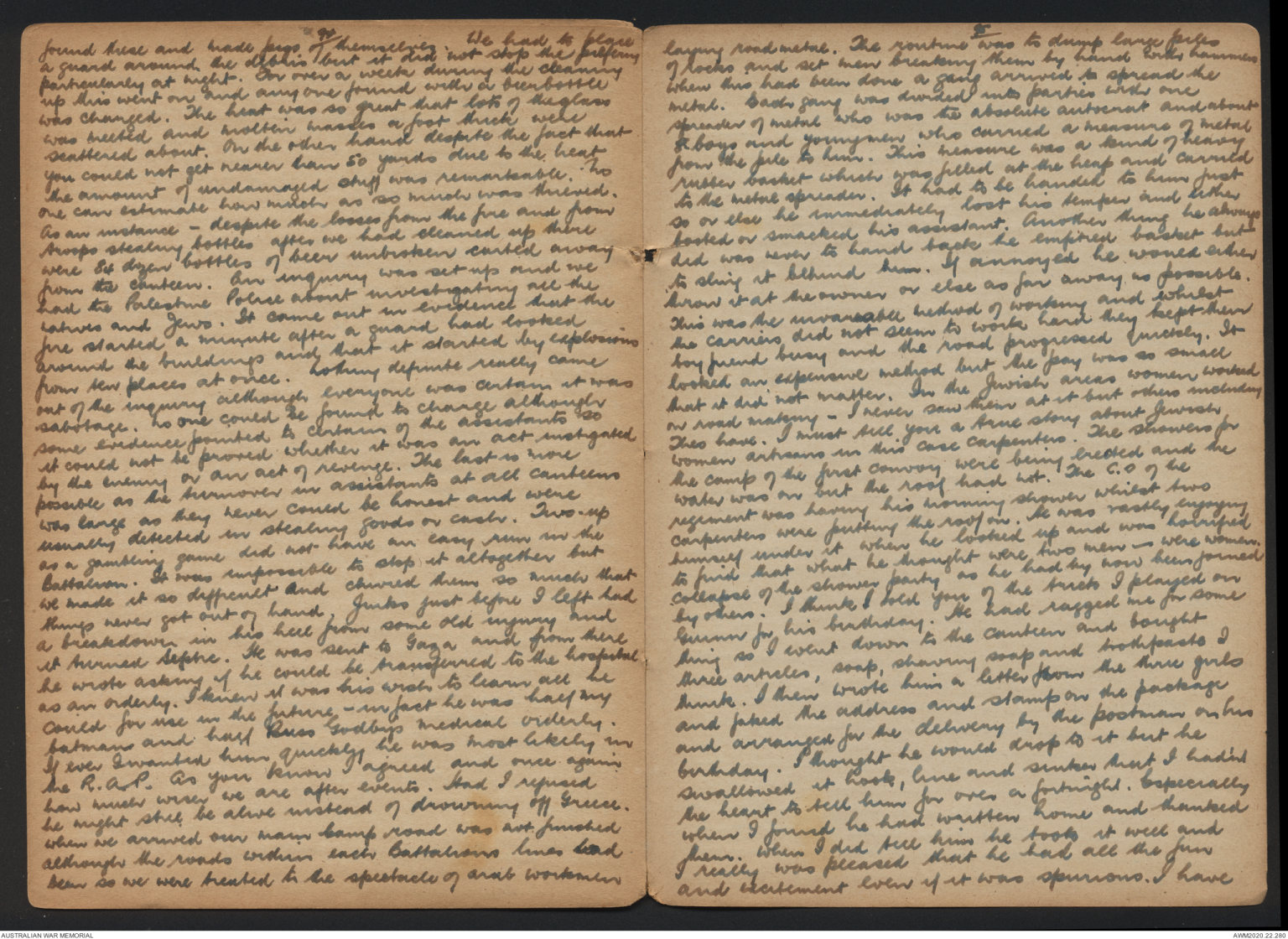
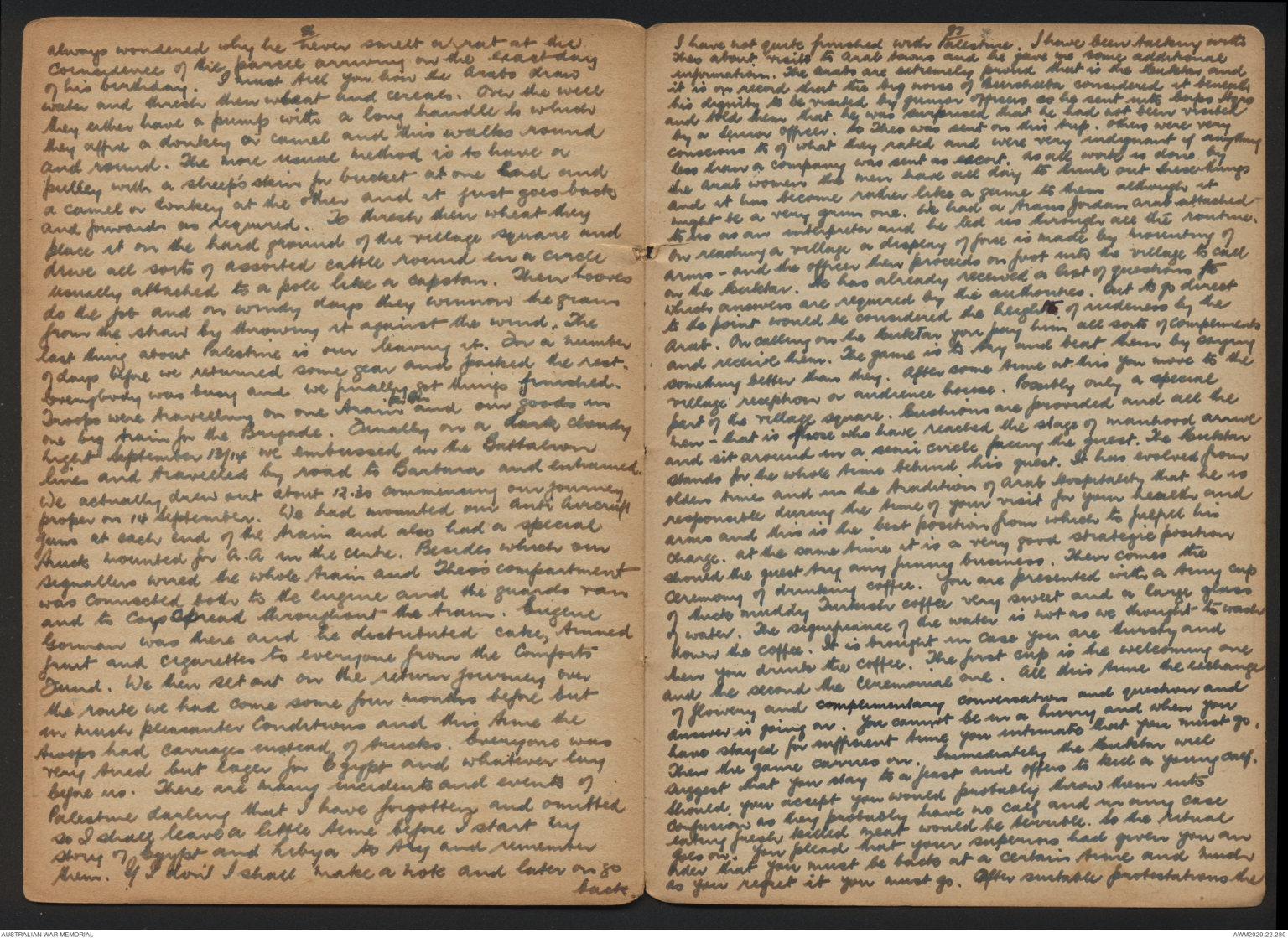
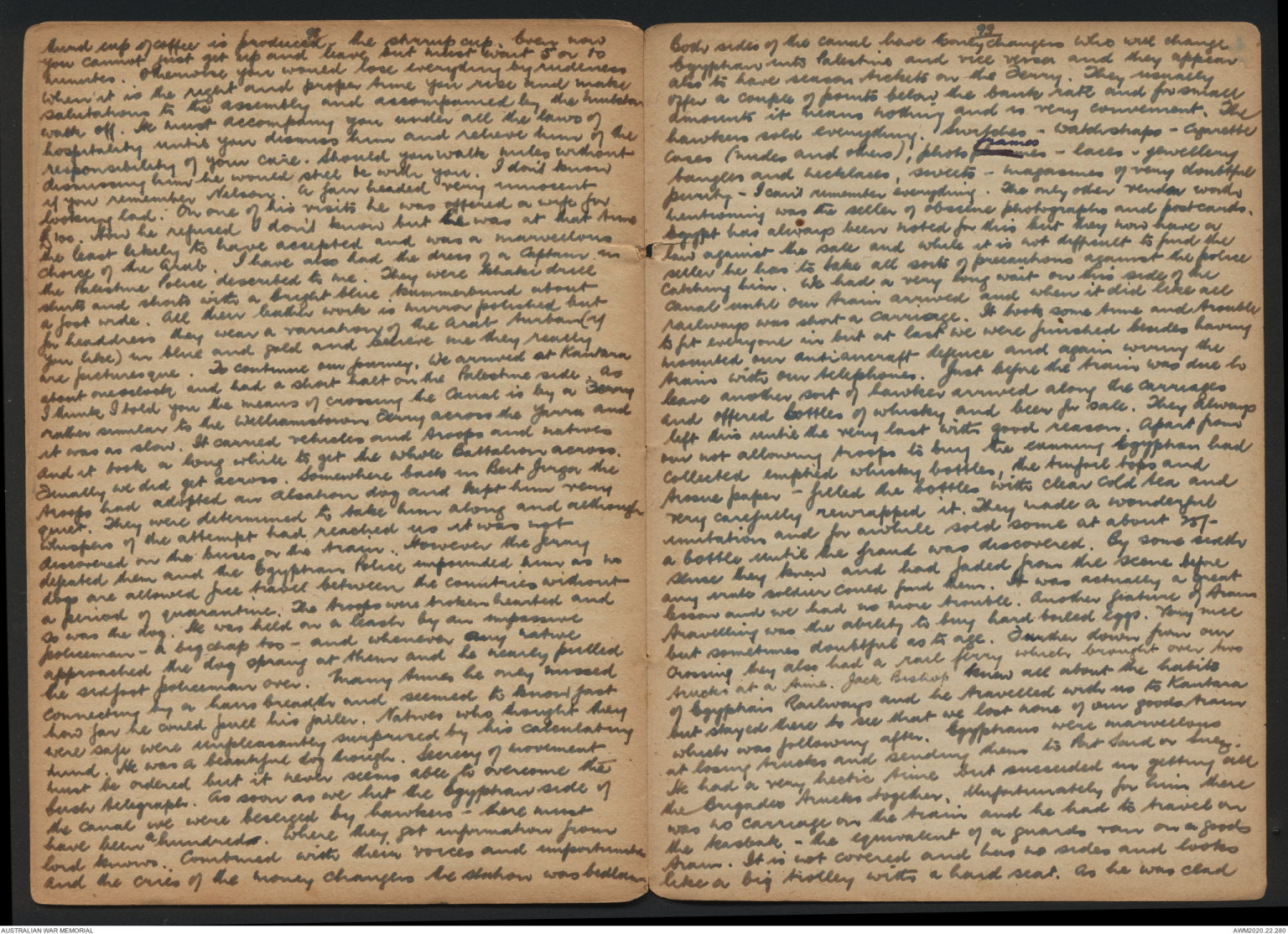
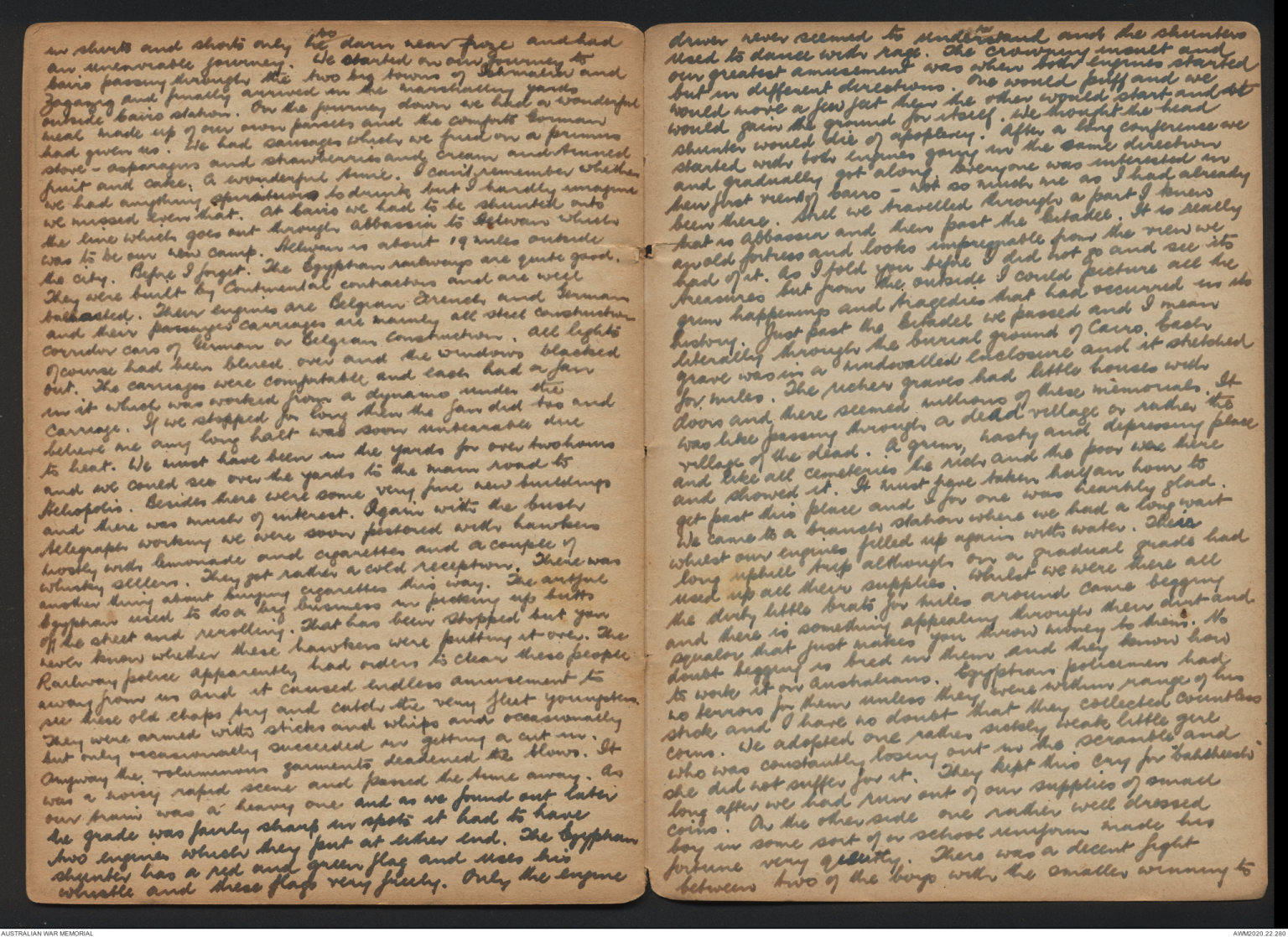
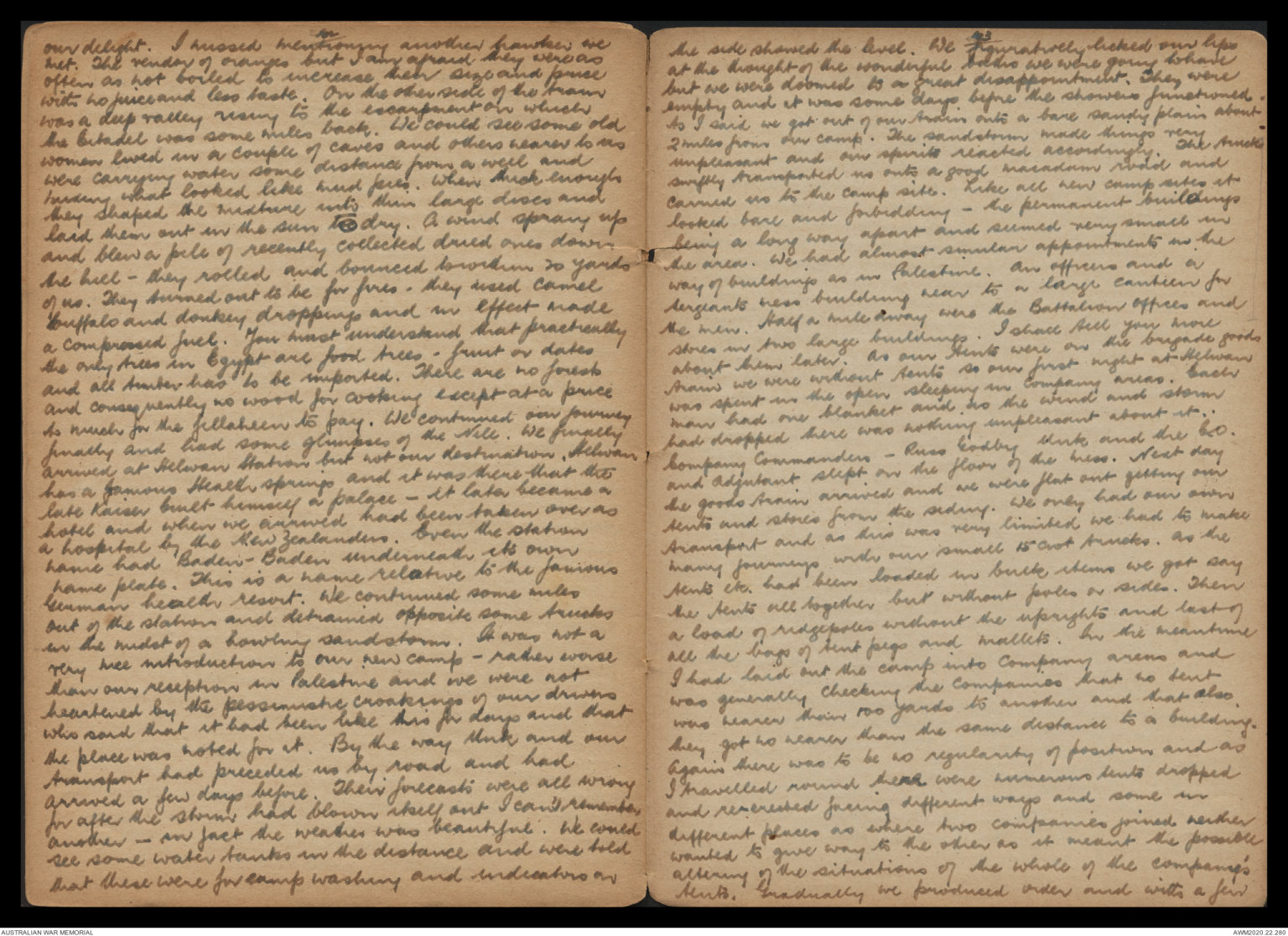
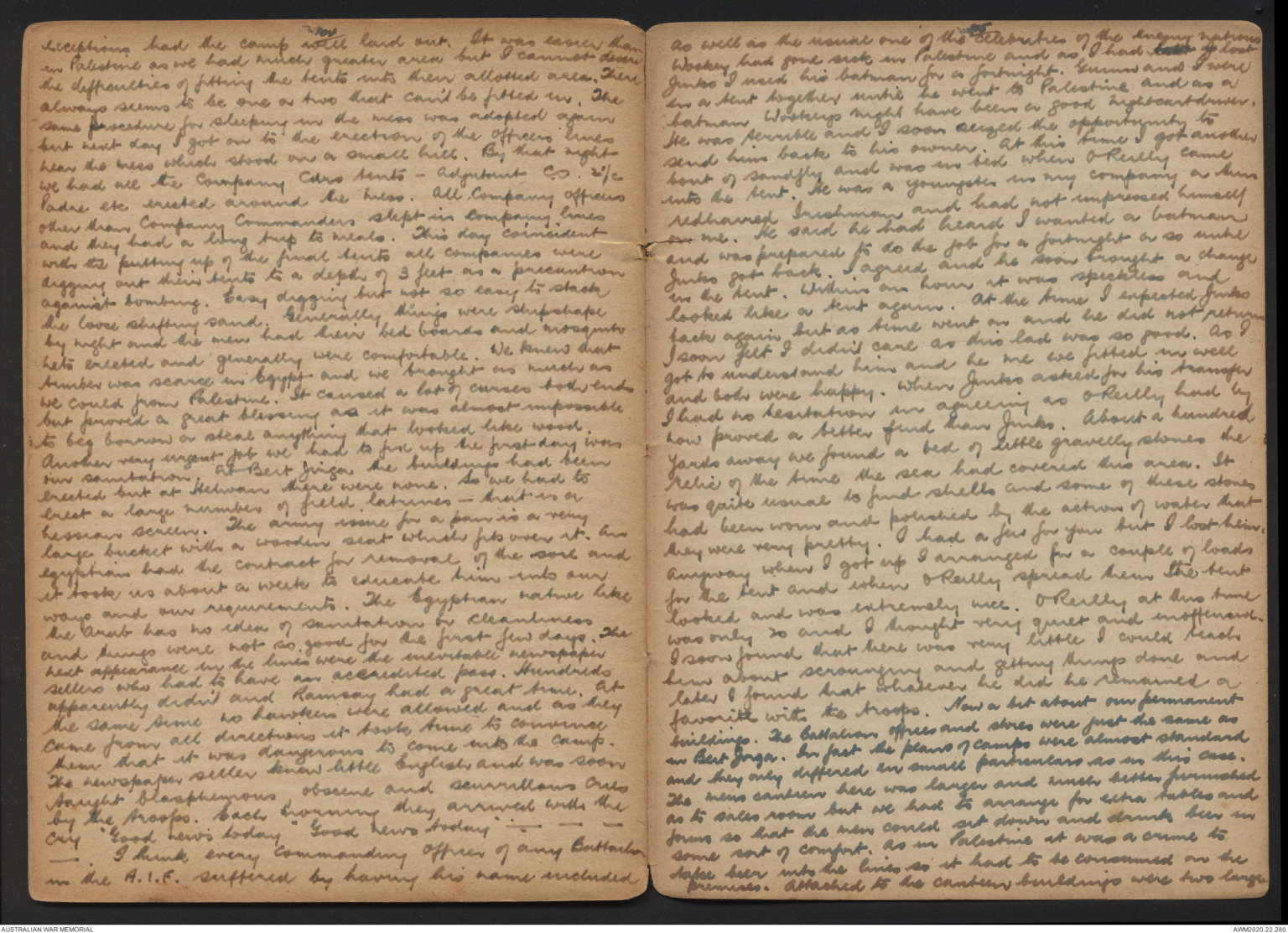
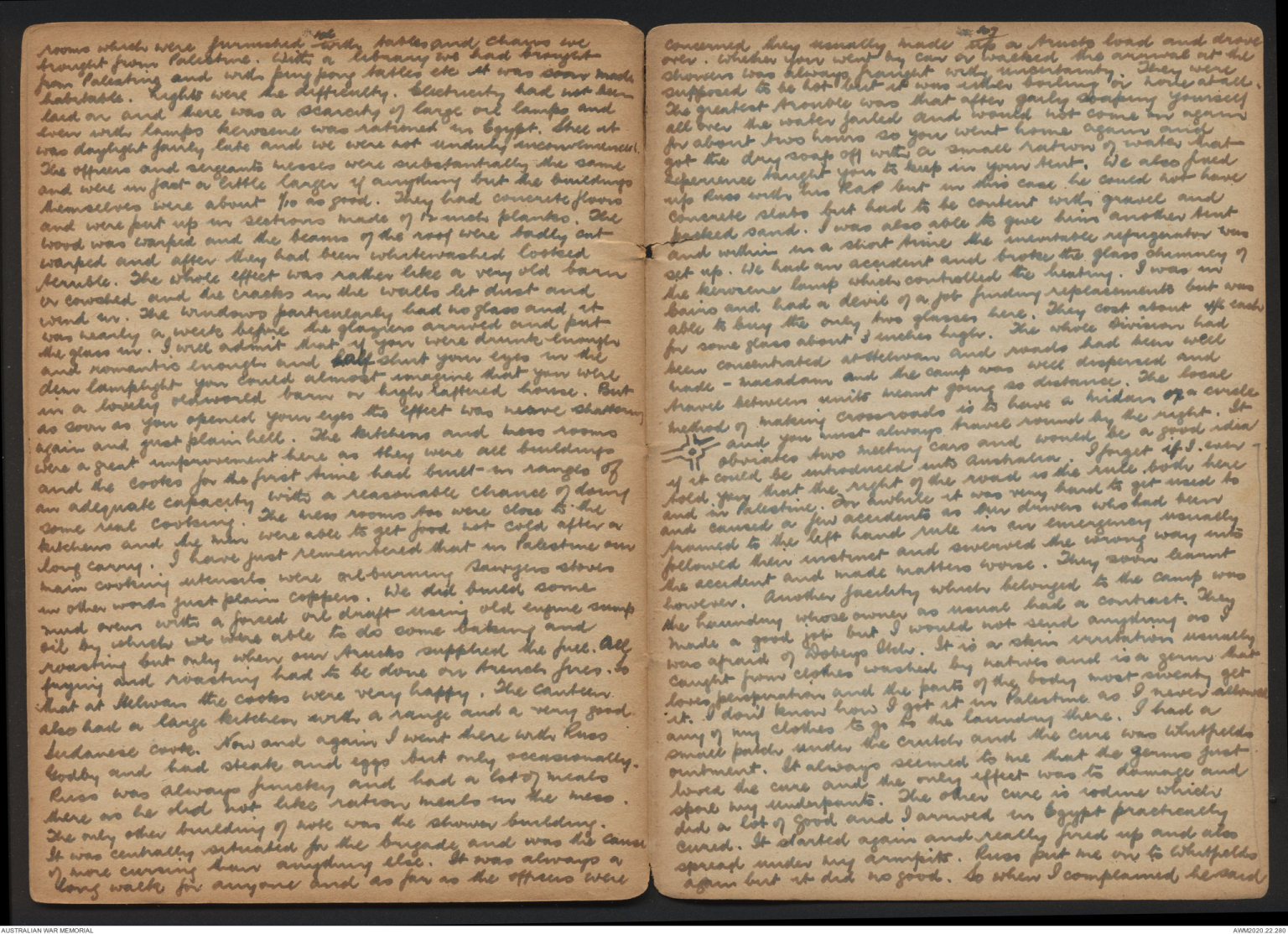
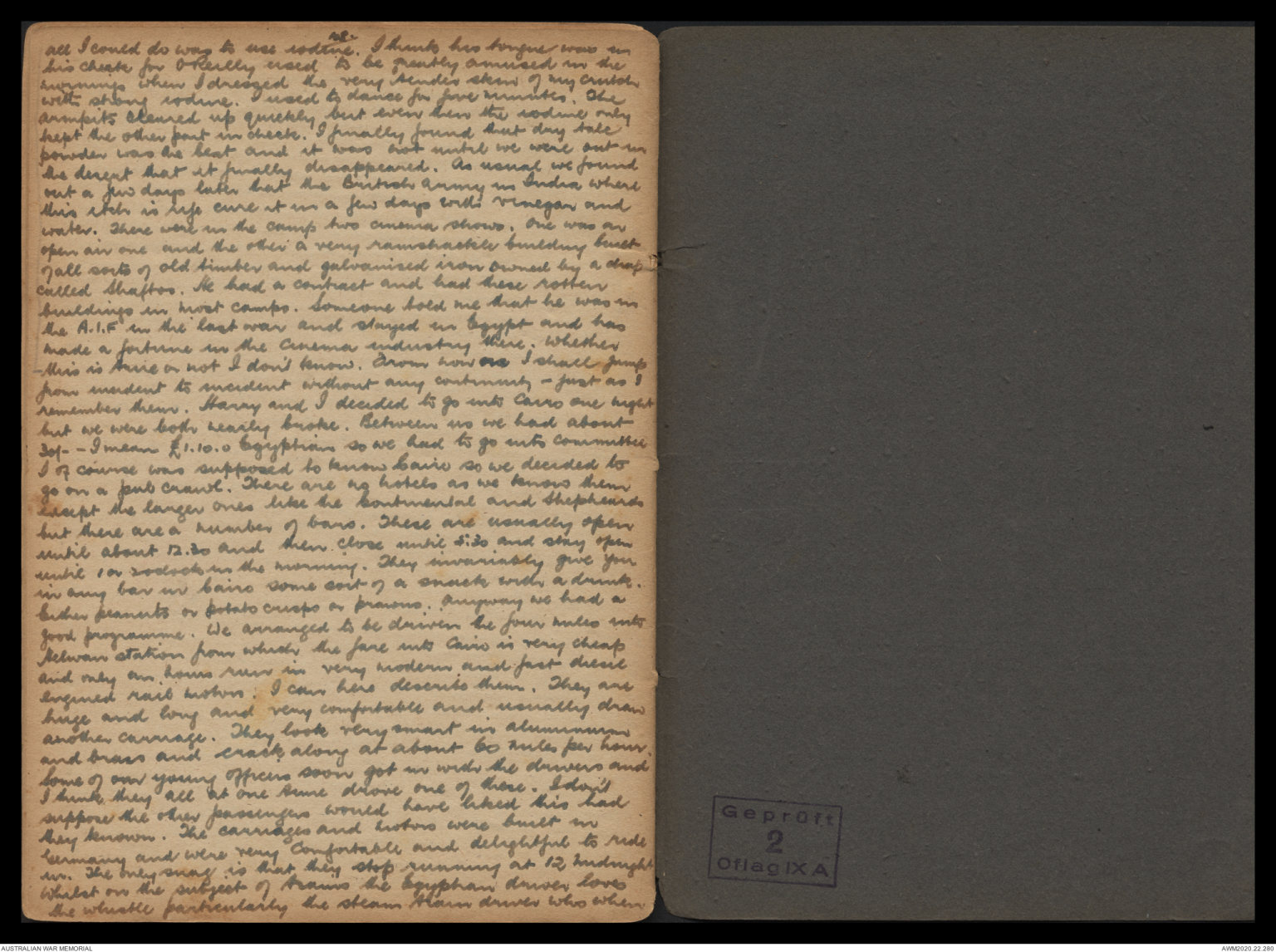
90
provided himself with a torch and in defiance of the
blackout and orders in his endeavour to see that the
old gentleman did not fall into Our slit trenches he
commenced flashing it. He struck a couple of our guards
who were fairly tense but the third time they ran against
what turned out to be one of our tough guys. His remarks
after Dakers saying that he had the Bishop with him
were : I don't care who the b-[[?]] is - you can put out
that bloody _____ light now and keep the bloody thing
out. They were a bit quiet when they got back. Harry
and I decided to go to Communion and do things properly
by not having breakfast until we returned as we
felt the Bishop would not like it. We arranged for our
mess Corporal for our breakfasts as well as a good wine
for the Bishop after his services as I think he was doing
another as well as ours. We came back and had ours
and then checked the Corporal about the Bishop's
breakfast. Imagine our surprise and annoyance
when he said "I don't think he'll want a second one.
He had a bloody big one early before he went." All
our goodness gone for nothing. At the ordinary church
service our beautiful padre covered us with confusion
and mortification. At the end of the service which the
Bishop preached he was just going to pronounce the
benediction after he had concluded his sermon and
had raised his hand when our bright boy stepped
forward and raised his hand and in a louder
and more sanctimonious voice pronounced it himself
He looked and sounded rather like a warning to the
Bishop that he was there only to preach the sermon
as a guest and that this is my dungheap. If there is
any blessing to be done Ill do it. Actually the
Bishop took it very well and when we apologised
to him in the mess afterwards revealed that he had
been an adjutant of a fighting Battalion in the last
war and knew all about Padres. The only other
church service of note was the memorial service we
held to Street and the others who were killed in the
aircrash. It was a big show and all the division were
present. Tom Blamey was also there and it was as
impressive as possible. I don't worry much about
those things and particularly as I was Field Officer
and had no rank out the ground I can tell you I
91
was fed up with it long before I heard the first hymn
sung. When we were first setting up the camp Russ
Godby had a large marquee for his Regimental Aid Post.
After the contractors had finished there were a large
number of concrete slabs left lying about. But not for
long. We used a lot to make bridges over the deep gutters
along our camp roads and then there were some over.
So we made a beautiful concrete floor for the R.A.P
and installed the Refrigerator that we brought from
Australia. Russ fitted it up beautifully and it
became the show place. Later during the Sandfly
epidemic I raked up a couple more EPI tents and
he established these as two wards and used his
orderlies for nurses. Strictly speaking this was against
regulations as we had a small camp hospital and
from there the patients were evacuated to Gaza. As
his wards were used purely for observation cases and
those who were not very ill the authorities - I mean
the medical authorities turned a blind eye and in fact
held him up as a model. Russ was everything that
a good Regimental C.O should be and turned up
trumps. I might say here that with the exception of one
disease we were the heartbeat Battalion in the A.I.F and
this was due to Russ and the backing Theo gave him in
putting his ideas into practice. Another force in
Palestine of which I must tell you are the Police. They
were recruited in three sections - English, Jew and
Arab. The British and I have changed to this as there
were members of all Dominions in it were distinguished -
Apart from their facial characteristics by the color of
their caps. All the police wore a sort of flowerpot cap
covered with sheeps wool - something like the Egyptian
Ambush with the curly wool outside. The British color
was grey - Arabs black and Jews brown. Naturally
Jews and Arabs were used for duty only in their own
national area but all were under the control of
British NCOs and officers in charge of units and
sections. Just like our own police they had town
serving police and in the country mounted men.
These were a fine body of men and looked as well
as our own. I believe they had to find their own
horses for which they received an allowance and
they were magnificent beasts and magnificently
cared for. On patrol we occassionally met some
and their turn out and bearing was a credit to
92
their force. We saw an echo of the Riots in the Police
armored cars which patrolled the roads and also they
ran another couple of armored cars on the railroad. Their
record is a wonderful one and their difficulties immense
and I should think as a Corps have done just as good
a job under as difficult conditions without the novelists
advertisement of the R.N.W.M.P of Canada. The native
drink of the Arabs is Arrack a very insidious and
deadly drink for anyone not used to it. Of course there
are many grades of it and it requires an intelligent drinker.
The Arabs of course drink it properly. I don't know what
it is made from - I think wheat or barley and when
mixed with water it turns milky. I never tasted it
but Halliday had some very good stuff at an Arabs
house but the normal troops efforts were on rotgut and
it was a kill stone dead drunk. The sufferers used
to find that after recovering from their period of unconsciousness
that a drink of water used to make them drunk
all over again and this lasted for about two days.
We were invited to a couple of parties in the Sergeants Mess
which under Sutton improved and had a good name
in the division. Actually I think that their meals were
better in their mess than in ours. They were the usual
sort of Sergeants parties with plenty of beer and the Sergeants
getting all confidential at the end. The last two or three
things I have about Palestine are first the Dance the
nurses at Gaza gave to all their officer friends in the
Division just before we left for Egypt. Our battalion was
invited en masse as a return for the ship and our
hospitality in Palestine. They had the sisters mess
decorated and it took the form of a dance - with
drinks turned on. As usual I made my duty dances
with the matron and had all I wanted to drink.
Young Mary was not able to be present as she had
a bout of sandfly fever and was confined to her tent
When the time for leavetaking came and good wishes
etc were being thrown around two of her tentmates
smuggled me out and I was allowed to say cheers
and receive her good wishes outside the tent. Their
lines were taboo but her tent was right against
the camp road so their was very little danger of
trouble. Everyone of note from every unit was
present including Stan Savige. About a week before
we left another incident occurred with many very
puzzling features. Henry and I had gone with John
93
Young down to the 6th Bn mess about half a mile away
and were having some drinks. We suddenly heard an
explosion and immediately thought a bomb had been
dropped or that someone had sabotaged part of our
water supply. We looked towards the direction of the
sound and found it in the direction of our lines. We
stumbled into the truck and went home. Their was a
decent glow and when we got over the hill found that
one of our buildings was on fire. I got there and found
that our canteen was on fire and burning beautifully.
We roused all companys and the nearest dropped
their tents whilst the rest of the companies stood to in
their lines and watched that none of their tents caught
with sparks. Any tent will catch easily and burn in
about 30 seconds due to the draught between the flies.
We also set guards around our other buildings for
with the malthoid roofing they might easily have caught
too. The fire started in the canteen for the men and
in an incredibly short space of time it was blazing
everywhere and the heat was blistering. The Padre
and some helpers had salvaged the library and
furniture from the mens reading room but that
was all we could save. We had no fire fighting
appliances for the water pressure was not very strong.
All water had to be pumped from two natural wells
into a high water tower on a hill where it was
chlorinated and fitted for use. It was all the pumps
at the wells could do to keep the tank filled and
the chuff chuff of the oil pumps went on for 24 hours.
All we could do was to watch the building and its contents
burn and to prevent it spreading to our tents. We
succeeded in doing this and just stood around watching
the damn thing burn. It was intervened by explosions of
materials in the fire - tins of kerosene and tins and
beer bottles exploding. It burnt fiercely for many hours
and was still glowing at dawn. Both the mens canteen
and contents and the tuck store and its contents all
went. There were three Refrigerators of a large size worth
hundreds of pounds each including all the food
and liquor stocks. Before we thought of it we had an
invasion of troops from everywhere who started a
private salvage. They were successful in getting some
toasted cigarettes and surprisingly enough there
were lots of bottles of beer which had not burnt. Troops soon
94
found these and made pigs of themselves. We had to place
a guard around the debris but it did not stop the pilfering
particularly at night. For over a week during the cleaning
up this went on and any one found with a beer bottle
was charged. The heat was so great that lots of the glass
was melted and molten masses a foot thick were
scattered about. On the other hand despite the fact that
you could not get nearer than 50 yards due to the heat
the amount of undamaged stuff was remarkable. No
one can estimate how much as so much was thieved.
As an instance - despite the losses from the fire and from
troops stealing bottles after we had cleaned up there
were 84 dozen bottles of beer unbroken carted away
from the canteen. An inquiry was set up and we
had the Palestine Police about investigating all the
natives and Jews. It came out in evidence that the
fire started a minute after a guard had looked
around the buildings and that it started by explosions
from ten places at once. Nothing definite really came
out of the inquiry although everyone was certain it was
sabotage. No one could be found to charge although
some evidence pointed to certain of the assistants so
it could not be proved whether it was an act instigated
by the enemy or an act of revenge. The last is more
possible as the turnover in assistants at all canteens
was large as the never could be honest and were
usually detected in stealing goods or cash. Two-up
as a gambling game did not have an easy run in the
Battalion. It was impossible to stop it altogether but
we made it so difficult and chivied them so much that
things never got out of hand. Jenks just before I left had
a breakdown in his heel from some old injury and
it turned septic. He was sent to Gaza and from there
he wrote asking if he could be transferred to the hospital
as an orderly. I knew it was his wish to learn all he
could for use in the future - in fact he was half my
batman and half Russ Godby's medical orderly.
If ever I wanted him quickly he was most likely in
the R.A.P. As you know I agreed and once again
how much wiser we are after events. Had I refused
he might still be alive instead of drowning off Greece.
When we arrived our main Camp road was not finished
although the roads within each Battalions lines had
been so we were treated to the spectacle of Arab workmen
95
laying road metal. The routine was to dump large piles
of rocks and set men breaking them by hand with hammers.
When this had been done a gang arrived to spread the
metal. Each gang was divided into parties with one
spreader of metal who was the absolute autocrat and about
8 boys and young men who carried a measure of metal
from the pile to him. This measure was a kind of heavy
rubber basket which was filled at the heap and carried
to the metal spreader. It had to be handed to him just
so or else he immediately lost his temper and either
booted or smacked his assistant. Another thing he always
did was never to hand back the emptied basket but
to sling it behind him. If annoyed he would either
throw it at the owner or else as far away as possible.
This was the invariable method of working and whilst
the carriers did not seem to work hard they kept their
boy friend busy and the road progressed quickly. It
looked an expensive method but the pay was so small
that it did not matter. In the Jewish areas women worked
on road making - I never saw them at it but others including
Theo have. I must tell you a true story about Jewish
women artisans in this case carpenters. The showers for
the camp of the first convoy were being erected and the
water was on but the roof had not. The C.O of the
regiment was having his morning shower whilst two
carpenters were putting the roof on. He was mostly enjoying
himself under it when he looked up and was horrified
to find that what he thought were two men - were women.
Collapse of the shower party as he had by now been joined
by others. I think I told you of the tricks I played on
Guinn for his birthday. He had ragged me for some
thing so I went down to the canteen and bought
three articles, soap, shaving soap and toothpaste I
think. I then wrote him a letter from the three girls
and faked the address and stamp on the package
and arranged for the delivery by the postman on his
birthday. I thought he would drop to it but he
swallowed it hook, line and sinker but I hadn't
the heart to tell him for over a fortnight. Especially
when I found he had written and thanked
them. When I did tell him he took it well and
I really was pleased that he had all the fun
and excitement even if it was spurious. I have
96
always wondered why he never smelt a rat at the
coincidence of the parcel arriving on the exact day
of his birthday. I must tell you how the Arabs draw
water and thresh their wheat and cereals. Over the well
they either have a pump with a long handle to which
they affix a donkey or camel and this walks round
and round. The more usual method is to have a
pulley with a sheep's skin for bucket at one end and
a camel or donkey at the other end and it just goes back
and forwards as required. To thresh their wheat they
place it on the hard ground of the village square and
drive all sorts of assorted cattle round in a circle
usually attached to a pole like a capstan. Their hooves
do the job and on windy days they winnow the grain
from the straw by throwing it against the wind. The
last thing about Palestine is our leaving of it. For a number
of days before we returned some gear and packed the rest.
Everybody was busy and we finally got things finished.
Troops were travelling on one train ∧[[?]] and our goods in
one big train for the Brigade. Finally on a dark cloudy
night September 13/14 we embussed in the Battalion
lines and travelled by road to Barbara and entrained.
We actually drew out about 12.30 commencing on our journey
proper on 14 September. We had mounted our anti aircraft
guns at each end of the train and also had a special
truck mounted for A.A in the centre. Besides which our
signallers wired the whole train and Theo's compartment
was connected both to the engine and the guards van
and to Corp spread throughout the train. Eugene
Gorman was there and he distributed cake, tinned
fruit and cigarettes to everyone from the Comforts
Fund. We then set out on the return journey over
the route we had come some four months before but
in much pleasanter conditions and this time the
troops had carriages instead of trucks. Everyone was
very tired but eager for Egypt and whatever lay
before us. There are many incidents and events of
Palestine darling that I have forgotten and omitted
so I shall leave a little time before I start my
story of Egypt and Libya to try and remember
them. If I don't I shall make a note and later on go back.97
97
I have not quite finished with Palestine. I have been talking with
Theo about visits to Arab towns and he gave me some additional
information. The Arabs are extremely proud that is the Buktar and
it is on record that the big noise of Beersheeba considered it beneath
his dignity to be visited by junior officers so he sent into Corps Hqrs
and told them that he was surprised that he had not been visited
by a Senior officer. So Theo was sent on this trip. Others were very
conscious to of what they rated and were very indignant if anything
less than a company was sent as escort. As all work is done by
the arab women the men have all day to think out these things
and it has become rather like a game to them although it
might be a very grim one. We had a trans Jordan Arab attached
to us as an interpreter and he led us through all the routine.
On reaching a village a display of force is made by mounting of
arms - and the officer then proceeds on foot into the village to call
on the Buktar. He has already received a list of questions to
which answers are required by the authorities. But to go direct
to the point would be considered the height of rudeness by the
Arab. On calling on the Buktar you pay him all sorts of compliments
and received them. The game is to try and beat them by saying
something better than they. After some time at this you move to the
village reception or audience house. Possibly only a special
part of the village square. Cushions are provided and all the
men - that is those who have reached the stage of manhood arrive
and sit around in a semi circle facing the guest. The Buktar
stands for the whole time behind his guest. It has evolved from
olden times and in the tradition of Arab Hospitality that he is
responsible during the time of your visit for your health and
arms and this is the best position from which to fulfill his
charge. At the same time it is a very good strategic position
should the guest try any funny business. Then comes the
ceremony of drinking coffee. You are presented with a tiny cup
of thick muddy Turkish coffee very sweet and and a large glass
of water. The significance of the water is not as we thought to wash
down the coffee. It is brought in case you are thirsty and
then you drink the coffee. The first cup is the welcoming one
and the second the ceremonial one. All this time the exchange
of flowing and complimentary conversations and question and
answer is going on. You cannot be in a hurry and when you
have stayed for sufficient time you intimate that you must go.
Then the game carries on. Immediately the Buktar will
suggest that you stay to a feast and offers to kill a young calf.
Should you accept you would probably throw them into
confusion as they probably have no calf and in any case
eating fresh killed meat would be terrible. So the ritual
goes on. You plead that your superiors had given you an
order that you must be back at a certain time and much
as you regret it you must go. After suitable protestations the
98
third cup of coffee is produced, the stirrup cup. Even now
you cannot just get up and leave but must wait 5 or 10
minutes. Otherwise you would lose everything by rudeness
when it is the right and proper time you rise and make
salutations to the assembly and accompanied by the Muktar
walk off. He must accompany you under all the laws of
hospitality until you dismiss him and relieve him of the
responsibility of your care. Should you walk miles without
dismissing him he would still be with you. I don't know
if you remember Nelson. A fair headed very innocent
looking lad. On one of his visits he was offered a wife for
$100. How he refused I don't know but he was at that time
the least likely to have accepted and was a marvellous
charge of the Arab. I have also had the dress of a Captain in
the Palestine Police described to me. They were shaker drill
shirts and shorts with a bright blue cummerbund about
a foot wide. All their leather work is mirror polished but
for headdress they wear a variation of the Arab turban (if
you like) in blue and gold and believe me they really
are picturesque. To continue our journey. We arrived at Kantara
about one oclock and had a short halt on the Palestine side as
I think I told you the means of crossing the Canal is by a Barry
rather similar to the Williamstown Ferry across the Yarra and
it was a slow. It carried vehicles and troops and natives
and it took a long while to get the whole Battalion across.
Finally we did get across. Somewhere back in Beit Jirja the
troops had adopted an Alaskan dog and kept him very
quiet. They were determined to take him along and although
whispers of the attempt had reached us it was not
discovered on the buses or the train. However the Jerry
defeated them and the Egyptian Police impounded him as no
dogs are allowed free travel between the countries without
a period of quarantine. The troops were broken hearted and
so was the dog. He was held on a leash by an impassive
policeman - a big chap too - and whenever any native
approached the dog sprang at them and he nearly pulled
the sixfoot policeman over. Many times he only missed
connecting by a hairs breadth and seemed to know just
how far he could pull his jailer. Natives who thought they
were safe were unpleasantly surprised by this calculating
hound. He was a beautiful dog though. Secrecy of movement
must be ordered but it never seems able to overcome the
bush telegraph. As soon as we hit the Egyptian side of
the canal we were beseiged by hawkers - there must
have been a hundreds. Where they got information from
lord knows. Combined with their voices and [[impertinence?]]
and the cries of the money changers the station was bedlam
99
Both sides of the canal have Money changers who will change
Egyptian with Palestine and vice versa and they appear
also to have season tickets on the Ferry. They usually
offer a couple of points below the bank rate and for small
amounts it means nothing and is very convenient. The
hawkers sold everything. Switches - watchstraps - Cigarette
cases (nudes and others), photo xxxxxxxx frames - laces - jewellery
bangles and necklaces, sweets - magazines of very doubtful
purity - I can't remember everything. The only other vendor worth
mentioning was the seller of obscene photographs and postcards.
Egypt has always been noted for this but they now have a
law against the sale and while it is not difficult to find the
seller he has to take all sorts of precautions against the police
catching him. We had a very long wait on this side of the
canal until our train arrived and when it did like all
railways was short a carriage. It took some time and trouble
to fit everyone in but at last we were finished besides having
mounted over anti aircraft defence and again wiring the
train with our telephones. Just before the train was due to
leave another sort of hawker arrived along the carriages
and offered bottles of whiskey and beer for sale. They always
left this until the very last with good reason. Apart from
now not allowing troops to buy the cunning Egyptians had
collected emptied whiskey bottles, the tinfoil tops and
tissue paper - filled the bottles with clear cold tea and
very carefully rewrapped it. They made a wonderful
imitation and for awhile sold some at about 25/-
a bottle until the fraud was discovered. By some sixth
sense they knew and had faded from the scene before
any irate soldier could find them. It was actually a great
lesson and we had no more trouble. Another feature of train
travelling was the ability to buy hard boiled eggs. Very nice
but sometimes doubtful as to age. Further down from our
crossing they also had a rail ferry which brought over two
trucks at a time. Jack Bishop knew all about the habits
of Egyptian Railways and he travelled with us to Kantara
but stayed there to see that we lost none of our goods train
which was following after. Egyptians were marvellous
at losing trucks and sending them to Part Said or Suez.
He had a very hectic time but succeeded in getting all
the Brigades trucks together. Unfortunately for him there
was no carriage on the train and he had to travel on
the kasbak - the equivalent of a guards van on a goods
train. It is not covered and has no sides and looks
like a big trolley with a hard seat. As he was clad
100
in shirts and shorts only he darn near froze and had
an unenviable journey. We started on our journey to
Cairo passing through the two big towns of Ishmalia and
Zagazig and finally arrived in the marshalling yards
outside Cairo station. On the journey down we had a wonderful
meal made up of our parcels and the comfort Gorman
had given us. We had sausages which we fried on a primus
stove - asparagus and strawberries and cream and tinned
fruit and cake; a wonderful time. I can't remember whether
we had anything spirituous to drink but hardly imagine
we missed even that. At Cairo we had to be shunted onto
the line which goes out through Abbassia to Helwan which
who to be our new camp. Helwan is about 19 miles outside
the city. Before I forget. The Egyptian railways are quite good.
They were built by Continental contractors and are well
ballasted. Their engines are Belgian French and German
and their passenger carriages are mainly all steel construction
corridor cars of German or Belgian construction. All lights
of course had been blued over and the windows blacked
out. The carriages were comfortable and each had a fan
in it which was worked from a dynamo under the
carriage. If we stopped for long then the fan did too and
believe me any long halt was soon unbearable due
to heat. We must have been in the yards for over two hours
and we could see over the yards to the main road to
Heliopolis. Besides there were some very fine new buildings
and there was much of interest. Again with the bush
telegraph working we were soon pestered with hawkers
mostly with lemonade and cigarettes and a couple of
whiskey sellers. They got rather a cold reception. there was
another thing about buying cigarettes this way. The artful
Egyptians used to do a big business in picking up butts
off the street and rerolling. That has been shopped but you
never know whether these hawkers were putting it over. The
Railway police apparently had orders to clear these people
away from us and it caused endless amusement to
see these old chaps try and catch the very fleet youngsters.
They were armed with sticks and whips and occasionally
but only occasionally succeeded in getting a cut in.
Anyway the voluminous garments deadened the blows. It
was a noisy rapid scene and passed the time away. As
our train was a heavy one and as we found out later
the grade was fairly sharp in spots it had to have
two engines which they put at either end. The Egyptian
shunter has a red and green flag and uses his
whistle and these flags very freely. Only the engine
101
driver never seemed to understand and the shunters
used to dance with rage. The crowning insult and
our greatest amusement was when both engines started
but in different directions. One would puff and we
would move a few feet then the other would start and it
would gain the ground for itself. We thought the head
shunter would die of apoplexy. After a long conference we
started with both engines going in the same direction
and gradually got along. Everyone was interested in
their first view of Cairo - not so much me as I had already
been there. Still we travelled through a part I knew
that is Abbassia and then past the Citadel. It is really
an old fortress and looks impregnable from the view we
had of it. As I told you before I did not go and see its
treasures but from the outside I could picture all the
grim happenings and tragedies that had occurred in its
history. Just past the Citadel we passed and I mean
literally through the burial ground of Cairo. Each
grave was in a mudwalled enclosure and it stretched
for miles. The richer graves had little houses with
doors and there seemed millions of these memorials. It
was like passing through a dead village or rather the
village of the dead. A grim, hasty and depressing place
and like all cemeteries the rich and the poor were there
and showed it. It must have taken half an hour to
get past this place and I for one was heartily glad.
We came to a branch station where we had a long wait
whilst our engines filled up again with water. Their
long uphill trip although on a gradual grade had
used up all their supplies. Whilst we were there all
the dirty little brats for miles around came begging
and there is something appealing through their dirt and
squalor that just makes you throw money to them. No
doubt begging is bred in them and they know how
to work it on Australians. Egyptian policemen had
no terrors for them unless they were within range of his
stick and I have no doubt that they collected countless
wins. We adopted one rather sickly weak little girl
who was constantly losing out in the scramble and
she did not suffer for it. They kept this cry for "baksheesh"
long after we had run out of our supplies of small
coins. On the other side one rather well dressed
boy in some sort of a school uniform made his
fortune very quietly. There was a decent fight
between two of the boys with the smaller winning to
102
our delight. I missed mentioning another hawker we
met. The vendor of oranges but I am afraid they were as
often as not boiled to increase their size and price
with no juice and less taste. On the other side of the train
was a deep valley rising to the escarpment on which
the Citadel was some miles back. We could see some old
women lived in a couple of caves and others nearer to us
were carrying water some distance from a well and
mixing what looked like mud pies. When thick enough
they shaped the mixture into thin large discs and
laid them out in the sun to dry. A wind sprang up
and blew a pile of recently collected dried ones down
the hill - they rolled and bounced to within 20 yards
of us. They turned out to be for fire - they used camel
buffalo and donkey droppings and in effect made
a compressed fuel. You must understand that practically
the only trees in Egypt are food trees - fruit or dates
and all timber has to be imported. There are no forests
and consequently no wood for cooking except at a price
to much for the fellaheen to pay. We continued on our journey
finally and had some glimpses of the Nile. We finally
arrived at Helwan Station but not our destination. Helwan
has a famous Health springs and it was there that the
late Kaiser built himself a palace - it later became a
hotel and when we arrived had been taken over as
a hospital by the New Zealanders. Even the station
house had Baden-Baden underneath its own
home plate. This is a name relative to the famous
German health resort. We continued some miles
out of the station and detrained opposite some trucks
in the midst of a howling sandstorm. It was not a
very nice introduction to our new camp - rather worse
than our reception in Palestine and we were not
heartened by the pessimistic croakings of our drivers
who said that it had been like this for days and that
the place was noted for it. By the way Mick and our
transport had preceded us by road and had
arrived a few days before. Their forecasts were all wrong
for after the storm had blown itself out I can't remember
another - in fact the weather was beautiful. We could
see some water tanks in the distance and were told
that these were for camp washing and indicators on
103
the side showed the level. We figuratively licked our lips
at the thought of the wonderful baths we were going to have
but we were doomed to a great disappointment. They were
empty and it was some days before the showers functioned.
As I said we got out of our train onto a bare sandy plain about
2 miles from our camp. The sandstorm made things very
unpleasant and our spirits reacted accordingly. The trucks
swiftly transported us onto a good macadam road and
carried us to the camp site. Like all new camp sites it
looked bare and forbidding - the permanent buildings
being a long way apart and seemed very small in
the area. We had almost similar appointments in the
way of buildings as in Palestine. An officers and a
sergeants mess building near to a large canteen for
the men. Half a mile away were the Battalion offices and
stores in two large buildings. I shall tell you more
about them later. As our tents were on the brigade goods
train we were without tents so our first night at Helwan
was spent in the open sleeping in company areas. Each
man had one blanket and as the wind and storm
had dropped there was nothing unpleasant about it.
Company Commanders - Russ Godby Mick and the C.O.
and adjutant slept on the floor of the mess. Next day
the goods train arrived and we were flat out getting our
tents and stores from the siding. We only had our own
transport and this was very limited we had to make
many journeys with our small 15 cwt trucks. As the
tents etc. had been loaded in bulk items we got say
the tents all together but without poles or sides. Then
a load of ridgepoles without the uprights and lastly
all the bags of tent pegs and mallets. In the meantime
I had laid out the camp into Company areas and
was generally checking the companies that no tent
was nearer than 100 yards to another and that also
they got no nearer than the same distance to a building.
Again there was to be no regularity of position and as
I travelled round there were numerous tents dropped
and re-erected facing different ways and some in
different places as where two companies joined nether
wanted to give way to the other as it meant the possible
altering of the situations of the whole of the company's
tents. Gradually we produced order and with a few
104
exceptions had the camp well laid out. It was easier than
in Palestine as we had much greater area but I cannot describe
the difficulties of fitting the tents into their allotted area. There
always seems to be one or two that can't be fitted in. The
same procedure for sleeping in the mess was adopted again
but next day I got on to the erection of the officers lines
near the mess which stood on a small hill. By that night
we had all the Company Cdrs tents - Adjutant C.O. 2 I/C
Padre etc erected around the mess. All Company officers
other than Company Commanders slept in Company lines
and they had a long trip to meals. This day coincident
with the putting up of the final tents all Companies were
digging out their tents to a depth of 3 feet as a precaution
against bombing. Easy digging but not so easy to stack
the loose shifting sand. Generally things were shipshape
by night and the men had their bed boards and mosquito
nets erected and generally were comfortable. We knew that
timber was scarce in Egypt and we brought as much as
we could from Palestine. It caused a lot of curses both ends
but proved a great blessing as it was almost impossible
to beg borrow or steal anything that looked like wood.
Another very urgent job we had to fix up the first day was
our sanitation. As Beit Jirja the building had been
erected but at Helwan there were none. So we had to
erect a large number of field latrines - that is a
hessian screen. The army issue for a man is a very
large bucket with a wooden seat which fits over it. An
egyptian had the contract for removal of the soil and
it took us about a week to educate him into our
ways and our requirements. The Egyptian native like
the Arab has no idea of sanitation or cleanliness
and things were not so good for the first few days. The
next appearance in the lines were the inevitable newspaper
sellers who had to have an accredited pass. Hundreds
apparently didn't and Ramsay had a great time. At
the same time no hawkers were allowed and as they
came from all directions it took time to convince
them that it was dangerous to come into this camp.
The newspaper seller knew little English and was soon
taught blasphemous obscene and scurrillous cries
by the troops. Each morning they arrived with the
cry "Good news today" Good news today" - - -
-. I think every Commanding Officer of any Battalion
in the A.I.F. suffered by having his name included
105
as well as the usual one of the celebrities of the enemy nations
Wookey had gone sick in Palestine and as I had lost
Jenks I used his batman for a fortnight. Guinn and I were
in a tent together until he went to Palestine and as a
batman Wookeys might have been a good nightcart driver.
He was terrible and I soon seized the opportunity to
send him back to his owner. At this time I got another
bout of sandfly and was in bed when OReilly came
into the tent. He was a youngster in my company a thin
redhaired Irishman and had not impressed himself
on me. He said he had heard I wanted a batman
and was prepared to do the job for a fortnight or so until
Jenks got back. I agreed and he soon brought a change
in the tent. Within an hour it was speckless and
looked like a tent again. At the time I expected Jinks
back again but as time went on and he did not return
I soon felt I didn't care as this lad was so good. As I
go to understand him and he me we fitted in well
and both were happy. When Jenks asked for his transfer
I had no hesitation in agreeing as OReilly had by
now proved a better find than Jenks. About a hundred
yards away we found a bed of little gravelly stones the
relic of the time the sea had covered this area. It
was quite usual to find shells and some of these stones
had been worn and polished by the action of water that
they were very pretty. I had a few for you but I lost them.
Anyway when I got up I arranged for a couple of loads
for the tent and when OReilly spread them the tent
looked and was extremely nice. OReilly at this time
was only 20 and I thought very quiet and unoffensive.
I soon found that there was very little I could teach
him about scrounging and getting things done and
later I found that whatever he did he remained a
favorite with the troops. Now a bit about our permanent
buildings. The Battalion offices and stores were just the same as
in Beit Jirja. In past the plans of camps were almost standard
and they only differed in small particulars as in this case.
The mens canteen here was larger and much better furnished
as to sales room but we had to arrange for extra tables and
forms so that the men could sit down and drink beer in
some sort of comfort. As in Palestine it was a crime to
take beer into the lines so it had to be consumed on the
premises. Attached to the canteen buildings were two large
106
rooms which were furnished with tables and chairs we
brought from Palestine. With a library we had brought
from Palestine and with ping pong tables etc it was soon made
habitable. Lights were the difficulty. Electricity had not been
laid on and there was a scarcity of large oil lamps and
even with lamps kerosene was rationed in Egypt. Still it
was daylight fairly late and we were not unduly inconvenienced.
The officers and sergeants messes were substantially the same
and were in fact a little larger if anything but the buildings
themselves were about 1/10 as good. They had concrete floors
and were put up in sections made of 12 inch planks. The
wood was warped and the beams of the roof were badly cut
warped and after they had been whitewashed looked
terrible. The whole effect was rather like a very old barn
or cowshed and the cracks in the walls let dust and
wind in. The windows particularly had no glass and it
was nearly a week before the glaziers arrived and put
the glass in. I will admit that if you were drunk enough
and romantic enough and half shut your eyes in the
dim lamplight you could almost imagine that you were
in a lovely oldworld barn or high raftered house. But
as soon as you opened your eyes the effect was nerve shattering
again and just plain hell. The kitchens and mess rooms
were a great improvement here as they were all buildings
and the cooks for the first time had built-in ranges of
an adequate capacity with a reasonable chance of doing
some real cooking. The mess rooms too were close to the
kitchens and the men were able to get food not cold after a
long carry. I have just remembered that in Palestine our
main cooking utensils were oil-burning Sawyers stoves
in other words just plain coppers. We did build some
mud ovens with a forced air draft using old engine sump
oil by which we were able to do some baking and
roasting but only when our trucks supplied the fuel. All
frying and roasting had to be done on trench fires. So
that at Helwan the cooks were very happy. The canteen
also had a large kitchen with a range and a very good
Sudanese cook. Now and again I went there with Russ
Godby and had steak and eggs but only occasionally.
Russ was always finicky and had a lot of meals.
The only other building of note was the shower building.
It was centrally situated for the brigade and was the cause
of more cursing than anything else. It was always a
long walk for anyone and as far as the officers were
107
concerned they usually made up a truck load and drove
over. Whether you went by car or walked the arrival at the
showers was always fraught with uncertainty. They were
supposed to be hot but it was either boiling or not at all.
The greatest trouble was that after gaily soaping yourself
all over the water failed and would not come on again
for about two hours so you went home and
got the dry soap off with a small ration of water that
experience taught you to keep in your tent. We also fixed
up Russ with his RAP but in this case he could not have
concrete slabs but had to be content with gravel and
packed sand. I was also able to give him another tent
and within a short time the inevitable refrigerator was
set up. We had an accident and broke the glass chimney of
the kerosene lamp which controlled the heating. I was in
Cairo and had a devil of a job finding replacements but was
able to buy the only two glasses here. They cost about 4/6 each
for some glass about 3 inches high. The whole Division had
been concentrated at Helwan and roads had been well
made - macadam and the camp was well dispersed and
travel between units meant going so distance. The local
method of making crossroads is to have a [[?]] of a circle
and you must always travel round by the right. It
obviates two meeting cars and would be a good idea
if it could be introduced into Australia. I forget if I ever
told you that right of the road is the rule both here
and in Palestine. For awhile it was very hard to get used to
and caused a few accidents as our drivers who had been
trained to the left hand rule in an emergency usually
followed their instinct and swerved the wrong way into
the accident and made matters worse. They soon learnt
however. Another facility which belonged to the camp was
the Laundry whose owner as usual had a contract. They
made a good job but I would not send anything as I
was afraid of Dobeys Itch. It is a skin irritation usually
caught from clothes washed by natives and is a germ that
loves perspiration and the parts of the body most sweaty get
it. I dont know how I got it in Palestine as I never allowed
any of my clothes to go to the laundry there. I had a
small patch under the crutch and the cure was Whitfields
ointment. It always seemed to me that the germs just
loved the cure and the only effect was to damage and
spoil my underpants. The other cure is iodine which
did a lot of good and I arrived in Egypt practically
cured. It started again and really fired up and also
spread under my armpits. Russ put me on to Whitfields
again but it did no good. So when I complained he said
108
all I could do was to use iodine. I think his tongue was in
his cheek for OReilly used to be greatly amused in the
mornings when I dressed the very tender skin of my crutch
with strong iodine. I used to dance for five minutes. The
armpits cleared up quickly but even then the iodine only
kept the other part in check. I finally found that dry talc
powder was the best and it was not until we were out in
the desert that it finally disappeared. As usual we found
out a few days later that the British Army in India where
this itch is rife cure it in a few days with vinegar and
water. There were in the camp two cinema shows. One was an
open air one and the other a very ramshackle building built
of all sorts of old timber and galvanised iron owned by a chap
called Shaftoo. He had a contract and had these rotten
buildings in most camps. Someone told me that he was in
the A.I.F in the last war and stayed in Egypt and has
made a fortune in the cinema industry there. Whether
this is true or not I don't know. From now on I shall jump
from incident to incident without any continuity - just as I
remember them. Harry and I decided to go into Cairo one night
but we were both nearly broke. Between us we had about
30/- - I mean £1.10.0 Egyptian so we had to go into committee
I of course was supposed to know Cairo so we decided to
go on a pub crawl. There are no hotels as we know them
except the larger ones like the Continental and Shepheards
but there are a number of bars. These are usually open
until about 12.30 and then close until 5.30 and stay open
until 1 or 2 oclock in the morning. They invariably give you
in any bar in Cairo some sort of a snack with a drink.
Either peanuts or potato crisps or prawns. Anyway we had a
good programme. We arranged to be driven the four miles into
Helwan station from which the fare into Cairo is very cheap
and only an hours run in very modern and fast diesel
engined rail motors. I can describe them. They are
huge and long and very comfortable and usually draw
another carriage. They look very smart in aluminium
and brass and crack along at about 60 miles per hour.
Some of our young officers soon got in with the drivers and
I think they all at one time drove one of these. I don't
suppose the other passengers would have liked this had
they known. The carriages and motors were built in
Germany and were very comfortable and delightful to ride
in. The only snag is that they stop running at 12 midnight.
Whilst on the subject of trains the Egyptian drive loves
the whistle particularly the steam train driver who when
 Lawrie Taylor
Lawrie TaylorThis transcription item is now locked to you for editing. To release the lock either Save your changes or Cancel.
This lock will be automatically released after 60 minutes of inactivity.